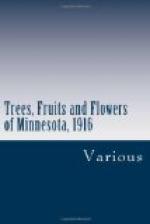Mr. Simmons: The question has come up two or three times in regard to peat soil for growing strawberries. Peat soil will grow strawberry plants first class, but the fruit is generally lacking. That is my experience. I grew some on peat soil for two or three seasons, and the plants grew prolific, but I didn’t get any fruit.
Mr. Ebler: I would like to ask Mr. Kellogg what treatment he would advise for a strawberry bed that through neglect has matted completely over, in which the rows have disappeared.
Mr. Kellogg: Plow out paths and rake out the plants and throw them away and work the bed over to rows about two feet wide.
President Cashman: I see you all appreciate expert advice. We have Mr. Kellogg well nigh tired.
Mr. Kellogg: Oh, no; I can stand it all day.
Mr. Cashman: I am sure you all agree that it is a great privilege to listen to Mr. Kellogg on this subject. If you will follow his advice very closely it will save you a great many dollars, even to those who don’t grow more than an ordinary family strawberry bed. He has had forty or fifty years of experience, and he has paid large sums of money for that experience and now turns it over to you free of charge, and I hope you will all profit by it.
Mr. Kellogg: I have grown probably 300 different varieties of strawberries, and the more kinds I grow the less money I make. (Laughter.)
Mr. Wedge: I would like to ask Mr. Kellogg and I think we would all be interested in knowing when he began growing strawberries?
Mr. Kellogg: Well, I don’t hardly know. I didn’t go into the business until 1852, but I commenced picking strawberries in 1835, and that was where the Indians had planted them. My father commenced growing strawberries when I was a boy, but when I got to be a man I went at it myself in 1852. (Applause.)
IN MEMORIAM—Mrs. Melissa J. Harris
Passed January 29, 1916.
Mrs. Melissa J. Harris, widow of the late John S. Harris, one of the charter members of our society and rightly called the godfather of the society, passed to her reward on January 29 last, at the age of eighty-five years. Since the death of her husband, which occurred in March, 1901, Mrs. Harris has made her home with some one of her four surviving children, all of whom live in the southeastern part of the state, not far from La Crescent, where Mr. and Mrs. Harris resided from 1856 up to the time of Mr. Harris’ death, some forty-five years.
[Illustration: Mrs. Melissa J. Harris.]
Many of the older members of this society have enjoyed the hospitality of this kindly home, among them the writer, who passed a very pleasant day there, looking over the experimental orchards of Mr. Harris, some twenty years ago. No member of our society surpassed Mr. Harris in his zeal for its welfare, and he was ready to sacrifice anything apparently to advance its interests. If the card index of the reports




